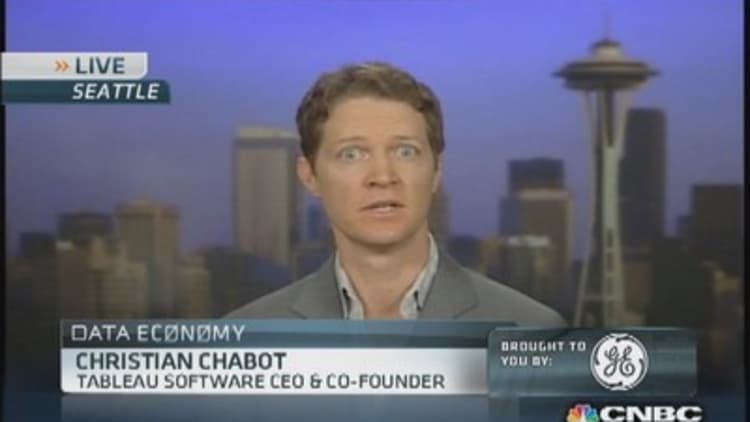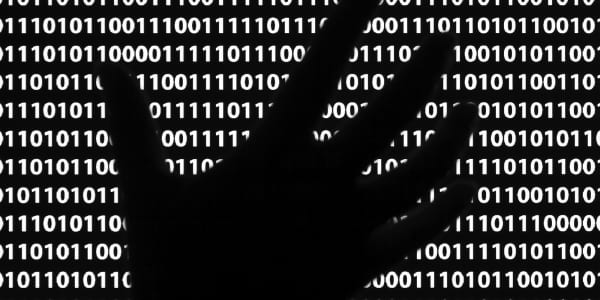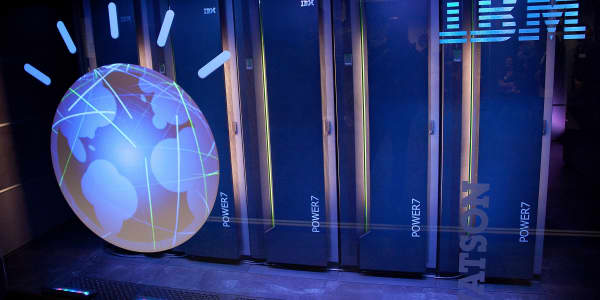This past week, there was an old-school battle of wits that captured the world's attention: a chess championship. How quaint! A realm in which the human mind is still king, it was dubbed the most exciting chess championship in decades, with the 22-year-old chess sensation Magnus Carlsen, the "Mozart of chess," at work on the board while the titans of Wall Street hung on the edge of their seats—they claim it's pure interest in the beauty of chess; we imagine they have uses for Carlsen's brain in structured products units.
It was a good reminder that even with the overwhelming nature of the information economy and long past Garry Kasparov's waving of the white flag against IBM's chess-playing grandmaster machines, human ingenuity still has a role to play—and, in fact, even Google admitted as much this past week. There are just some tasks at which Google's algorithms remain at a competitive disadvantage to actual human beings, one being personalized answers to questions that require expert assistance. And so Google announced its "helpouts" product, which the New York Times said was "an acknowledgement by the company that its search engine misses a lot of information that people want."
Now, you may ask, doesn't Google already have YouTube for that purpose? Not exactly. Consider that Magnus Carlsen could consult with IBM's Deep Blue on a move in real time, something he could not do through YouTube footage of Deep Blue beating Kasparov. Wait, that's not right. Here's the example the Times and Google provided: "a yoga teacher could instruct a student to hold her arm at a different angle or a lactation consultant could suggest that a mother position her infant in a different way." Namaste.
For more on the battle between man and machine, we recommend for this weekend's reading list Brian Christian's "The Most Human Human," one man's—who happens to be a computer scientist and poet—account of his role in the annual Turing Competition, as he tried to convince human judges he was a human against a bunch of computers aiming to do the same thing. It's sort of like "The Voice" meets "Blade Runner."
(Read more: Charts that changed the world)
Yes, big data is worth the investment: IBM
From the annals of self-interested industry studies, this just in from IBM's Institute for Business Value. In a report titled, "Analytics: A Blueprint for Value," IBM found that within six months of adopting analytics technology, some 40 percent of companies counted a quick return on investment (ROI). "In this exciting new piece of research," which uses the word "analytics" so many times it starts to roll off the tongue with as much poetry as "colonoscopy," the IBM Institute said it surveyed 900 business and IT executives from 70 countries.
(Read more: 10 surprising ways companies use your data)
Google's mystery ship rumors docked
Last week "we" provided a variety of theories about the mystery barge in San Francisco Bay that is owned by Google—all very good theories, "we" thought, including Google's preparation for the end of the world with something akin to Noah's Ark: two of every kind of Google server ready to float until the floodwaters recede. Well, it turns out we may have been wrong, because Google was so tired of listening to the press erroneously report on what the barge is for, it finally fessed up—sort of. Google said, under press duress, that the barge will be an "interactive space where people can learn about new technology."
But there is mystery yet, because the barge is slated to be more, much more, than just a schoolroom on waves. It's being built as an "unprecedented artistic structure" made of recycled shipping containers and with sails that will be "reminiscent of fish fins, which will remind visitors that they are on a seaworthy vessel," according to a report on SF Gate. Just in case the flood comes.
(Read more: Who's viewing your Instagram, and profiting from it?)
The week in "big data is a bunch of baloney"
In this week's edition of all the buzz about big data is a bunch of @#$@%^$&^$!, John Horgan writes in a Scientific American blog, "We've heard a lot about how 'Big Data'—which as far as I can tell is just data mining in a glossy new wrapper—are going to revolutionize science and help us create a better world. These claims strike me as all too familiar. They remind me of the hype generated in the 1980s by chaos and in the 1990s by complexity (which was just chaos in a glossy new wrapper). Chaos and complexity enthusiasts promised (and are still promising) that ever-more-powerful computers plus jazzy new software and math were going to crack riddles that resisted more traditional scientific methods."
In fact, Horgan argued that big data is harming science by attracting the best and brightest minds to profits instead of taking them on a quest for scientific truth. Oh, that's rich (bad word choice)—I mean, naive.
Meanwhile, big data is making the world a better place
To protect businesses from viruses and "data-stealing Trojans," there is only one solution, writes Dan Hubbard, chief technology officer of OpenDNS, in a piece for USA Today. "We need to capture a massive amount of data from the Internet, which is the source of cyber attacks. To yield the most reliable results, researchers must cast a wide net that is distributed across geographies, sectors, segments and protocols. Data diversity plays a critical role in our ability to accurately identify attacks."
So, basically, since we have moved our entire lives online and as a result made ourselves and all of our data vulnerable to online attacks, we need to use big data to limit those attack opportunities. Now there's a virtuous—or is it vicious—cycle of profits for you, John Horgan.
(Read more: You can live forever! Digitally)
Absolutely phabulous
Never heard of a phablet? What rock have you been living under—still playing "Adventure" on your Atari 2600? Why not search for the "white key" on an oversized smartphone handset that is a cross between a phone and tablet. Sales of the so-called phablets have surged this year. A quarter of a billion smartphones were shipped in the third quarter of 2013, with 22 percent of these featuring a screen size of 5 inches of more, according to a report by Canalys research firm published this past week. Some 56 million of the larger-screen devices were shipped over the three months, compared to 45 million the previous quarter—a 24 percent rise. Truly, we live in wonderful times. The agonizing choice that consumers face between purchasing both a tablet and smartphone or limiting themselves to one or the other has now been taken off the list of contemporary anxieties: You must buy a smartphone, and a tablet, and a phablet as well—or, really, you may as well remain on your Atari 2600.
#Time to turn a profit
OK, Dick Costolo, Twitter CEO and newest billionaire, you've said in the wake of your company's IPO that there's much work to be done, such as turning a profit. Just how will Twitter, now valued at around $30 billion, accomplish that? Twitter commerce. Twitter could use information about users' location and interests to offer products or deals. Eventually, expect Twitter to allow users to link a credit card to their account for one-click purchases within Twitter. Twitter could also partner with the likes of eBay, Amazon or Etsy to link accounts so users could make a purchase without inputting credit card information, according to a CNBC report.

(Read more: Apps are spying on your intimates)
The dark side of the data economy
Joan Harwood, treasurer of Dartmouth Fire District No. 3 in Massachusetts, handles an annual budget of about $1 million. While doing some routine online banking for the firehouse in 2010, she discovered that $375,000 was missing from the account. The thief: the malware Zeus Trojan, operated by a Russian cybercrime ring, according to a CNBC report. Cybercrime—which ranges from bank account hacking to phishing (in which fraudulent emails are sent with the aim of obtaining data or cash from the recipient)—is vast. According to the Internet Crime Complaint Center, consumers lost more than $525 million to cybercrimes last year—an 8.3 percent rise from 2011. A study by McAfee and the Center for Strategic and International Studies estimates that the cost of cybercrime may exceed $100 billion a year. And there's big money tied up in defending the data economy from hackers, even a growing competition circuit: the "world series of hacking."
Bitcoin now a teenager
Speaking of cyberswindles, bitcoin, the irascible yet irrepressible infant of the currency markets, is growing up. The virtual currency hit a new high this week above $270, besting an April all-time high that preceded a crash. Yet this time bitcoin may have more staying power, and a big part of the staying power is the evolution of the technology infrastructure that supports trading, according to an analysis from ConvergEx. It may be a decentralized trading framework, but it's showing signs of order amid the chaos of virtual currency. In fact, the next big threat in the bitcoin world may be related to how easy "miners" can take control of the currency's infrastructure.
—By Eric Rosenbaum, CNBC.com





